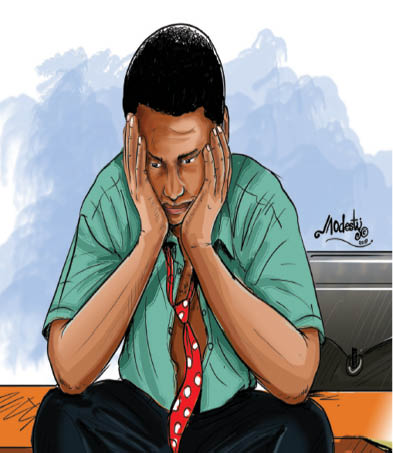I find it difficult to sleep
This serves as a “shout out” to you and the Daily Trust newspaper for creating and sustaining this weekly column for almost two decades now. It is a “must read” for me and my family members. Recently I began to find it difficult to sleep till around 3am, and wake up around 7am. So I […]

This serves as a “shout out” to you and the Daily Trust newspaper for creating and sustaining this weekly column for almost two decades now. It is a “must read” for me and my family members.
Recently I began to find it difficult to sleep till around 3am, and wake up around 7am. So I have barely four hours sleep daily. I am stressed up and tired because of that. Kindly discuss lack and/or difficulty of sleep for your teeming readers.
Worried married man.
Thanks for your question and kind words to our work. What you described in your question is termed Insomnia, which is difficulty in falling asleep or staying asleep, even when a person has the chance to do so. People with Insomnia can feel dissatisfied with their sleep and usually experience one or more of the following symptoms: fatigue, low energy, difficulty concentrating, mood disturbances, and decreased performance in work or at school.
Insomnia may be characterised based on its duration
1. Acute insomnia is brief and often happens because of life circumstances (for example, when you can’t fall asleep the night before an exam, or after receiving stressful or bad news). Many people may have experienced this type of passing sleep disruption, and it tends to resolve without any treatment.
2. Chronic insomnia is disrupted sleep that occurs at least three nights per week and lasts at least three months. Chronic insomnia disorders can have many causes. Changes in the environment, unhealthy sleep habits, shift work, other clinical disorders, and certain medications. Chronic insomnia can be co-morbid, meaning it is linked to another medical or psychiatric issue, although sometimes it’s difficult to understand this cause and effect relationship.
3. People with insomnia tend to have difficulty falling asleep (onset), staying asleep (maintenance), and/or they wake up too early in the morning, similar to what you are experiencing.
4. Treatment for insomnia can include behavioural, psychological, medical components or some combination thereof.
Symptoms of Insomnia are:
1. Difficulty getting to sleep (taking more than 45 minutes to get to sleep),
2. Difficulty staying asleep (frequent awakenings and difficulty getting back to sleep).
3. Early morning waking.
4. Feeling tired and un-refreshed in the morning.
Insomnia can be described as either transient, intermittent or chronic. Transient lasts only a few nights to a few weeks. Intermittent insomnia occurs occasionally but not every night. Chronic insomnia occurs most nights and lasts three or more weeks.
Some of the causes of Insomnia are:
1. Lifestyle; eating late at night, jet lag, hunger, taking too much caffeine especially in the evening, stimulant drugs, including nicotine especially in the evening too.
2. Environment; noise (e.g. partner snoring), uncomfortable bed or bedroom.
3. Physical health problems: sleep apnoea (abnormal breathing while asleep), asthma, tinnitus (musical sound in the ear), prostate problems that mean frequent trips to the toilet at night, and indigestion.
4. Psychological problems including stress or grief.
5. Mental health problem such as depression or anxiety.
6. Medication, e.g. certain tablets for asthma
7. Absence of fulfilled sexual life
8. Rarely, Insomnia occurs even when none of the above are present. This is known as ‘primary’ insomnia.
Examples of suggestive remedies.
1. Avoid taking cat-naps (siesta) during the day.
2. Reduce coffee intake, especially in the evening.
3. For those who take alcoholic drink. It should be done in moderation.
4. Reduce smoking; nighttime breathing problems are more likely in smokers.
5. Regular exercise, but avoid strenuous activity immediately before going to bed.
6. Try to get into a daily routine. Go to bed the same time each night and get up the same time each morning.
7. Avoid heavy or rich meals, especially few hours before bedtime.
8. If you can’t sleep, get up and read in a dim light until you feel sleepy.
9. Mentally dealing with the day’s unfinished business is also helpful. Writing down any worries to deal with the next day may help to clear them from our minds and prevent them from re-surfacing in the early hours.
